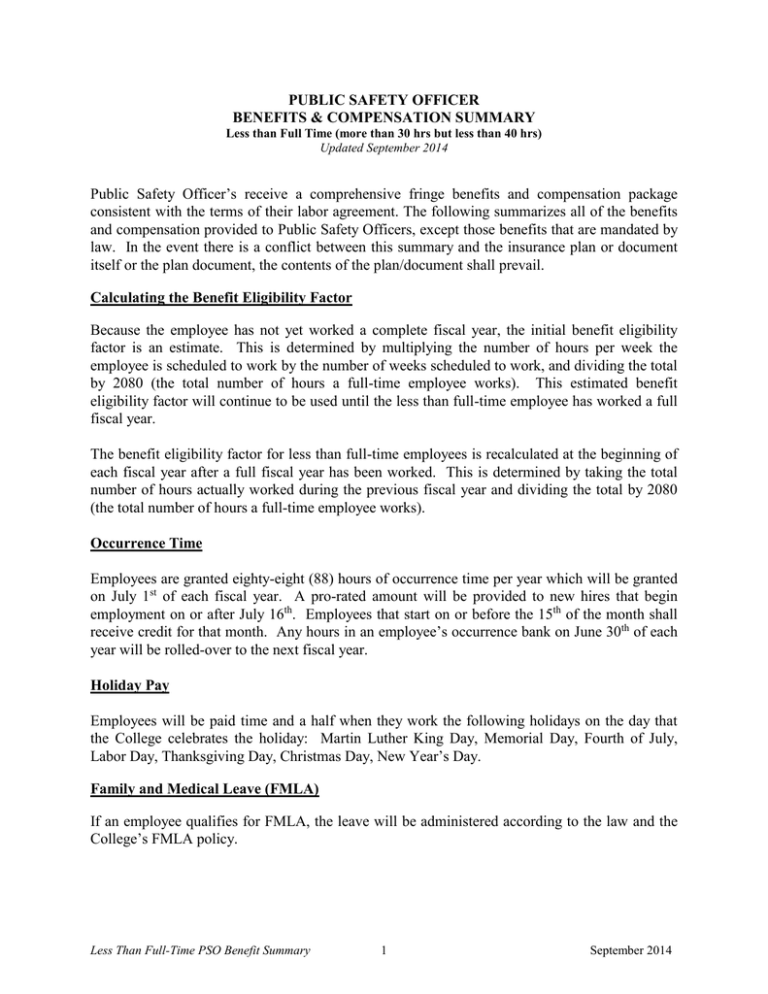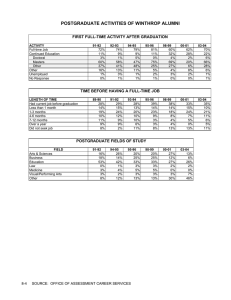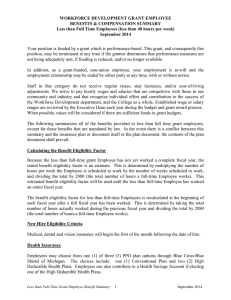PUBLIC SAFETY OFFICER BENEFITS & COMPENSATION SUMMARY
advertisement

PUBLIC SAFETY OFFICER
BENEFITS & COMPENSATION SUMMARY
Less than Full Time (more than 30 hrs but less than 40 hrs)
Updated September 2014
Public Safety Officer’s receive a comprehensive fringe benefits and compensation package
consistent with the terms of their labor agreement. The following summarizes all of the benefits
and compensation provided to Public Safety Officers, except those benefits that are mandated by
law. In the event there is a conflict between this summary and the insurance plan or document
itself or the plan document, the contents of the plan/document shall prevail.
Calculating the Benefit Eligibility Factor
Because the employee has not yet worked a complete fiscal year, the initial benefit eligibility
factor is an estimate. This is determined by multiplying the number of hours per week the
employee is scheduled to work by the number of weeks scheduled to work, and dividing the total
by 2080 (the total number of hours a full-time employee works). This estimated benefit
eligibility factor will continue to be used until the less than full-time employee has worked a full
fiscal year.
The benefit eligibility factor for less than full-time employees is recalculated at the beginning of
each fiscal year after a full fiscal year has been worked. This is determined by taking the total
number of hours actually worked during the previous fiscal year and dividing the total by 2080
(the total number of hours a full-time employee works).
Occurrence Time
Employees are granted eighty-eight (88) hours of occurrence time per year which will be granted
on July 1st of each fiscal year. A pro-rated amount will be provided to new hires that begin
employment on or after July 16th. Employees that start on or before the 15th of the month shall
receive credit for that month. Any hours in an employee’s occurrence bank on June 30th of each
year will be rolled-over to the next fiscal year.
Holiday Pay
Employees will be paid time and a half when they work the following holidays on the day that
the College celebrates the holiday: Martin Luther King Day, Memorial Day, Fourth of July,
Labor Day, Thanksgiving Day, Christmas Day, New Year’s Day.
Family and Medical Leave (FMLA)
If an employee qualifies for FMLA, the leave will be administered according to the law and the
College’s FMLA policy.
Less Than Full-Time PSO Benefit Summary
1
September 2014
Personal Leave of Absence
Personal leaves of absence may be approved at the discretion of the College. Such unpaid leaves
will be administered consistent with the procedures outlined in the various collective bargaining
agreements.
Health Insurance
Employees may choose from one (1) of three (3) PPO plan options through Blue Cross/Blue
Shield of Michigan. The choices include: one (1) Conventional Plan and two (2) High
Deductible Health Plans. Employees can also contribute to a Health Savings Account if electing
one of the High Deductible Health.
Premium Contributions
As required under PA152 of 2011, employees may be required to pay a portion of the medical
premium through bi-weekly payroll deductions.
A part-time employee who elects coverage for him/herself or him/herself and his/her eligible
dependents must pay, in addition to the full-time employee premium contribution, a prorated amount
of the College’s premium contribution based on their benefit eligibility factor (BEF) in effect at the
time of application for the benefit, with the balance of the premium being paid by the College. (See
Article 19, Section 2 for benefit eligibility factor calculation rules.)
If an employee’s BEF (percentage of full time hours worked) is .80 or greater, the employee
is treated as a full-time employee and will not be required to pay anything in addition to the
full-time premium.
If an employee’s BEF is less than .80, their additional premium portion will be calculated as
follows, (.80 – BEF) x College’s premium contribution.
The above scale is applicable only to the calculation of part-time employee contributions for the
Medical Insurance benefit and is not applicable to any other benefit.
See your HR Representative for current rates and accurate calculation of your premium
contribution, if applicable.
Dental
Effective January 1, 2015, the plan provides 100% coverage for preventative services and 80%
coverage for specified services, including implants, up to a maximum of Two Thousand ($2,000)
Dollars per calendar year per person, with the exception of orthodontic services which is a
lifetime maximum of One Thousand Five Hundred ($1,500) Dollars for covered individuals up
to age nineteen (19). An additional benefit will include implants covered at 80%.
Less Than Full-Time PSO Benefit Summary
2
September 2014
Vision
Effective January 1, 2015, the plan provides 100% coverage for in network exams, lenses and
medically necessary contacts. In network frames are covered at $65 plus 20% off remaining
balance. In network cosmetic contacts are covered at $125 plus 10% off remaining balance.
Flexible Spending Accounts
Employees are eligible to participate in the College’s Flexible Spending Accounts. The Medical
Spending Account allows you to use pretax dollars to pay for health expenses not covered by
another source, as defined by the IRS. You can use the Dependent Care Spending Account to
pay for dependent care expenses on a tax-free basis. Funds forfeited by employees in their
individual flexible spending accounts at year end will be utilized by the College to offset benefit
costs in the subsequent year.
Health Savings Accounts
Employees that elect a High Deductible Health Plan are eligible to participate in a Health
Savings Account. The Health Savings Account allows you to use pretax dollars to pay for health
expenses not covered by another source, as defined by the IRS.
Life Insurance
Employees receive a $10,000 life insurance policy and a $20,000 accidental death or
dismemberment policy.
Supplemental Life and Disability Insurance:
Supplemental Life Insurance: Employees may purchase, at their expense and through payroll
deduction, additional life insurance from the College vendor for life insurance. Terms and
conditions of such supplemental life insurance are determined by the carrier.
Supplemental Disability Insurance: Employees may purchase, at their expense and through
payroll deduction, additional disability insurance from AFLAC. Terms and conditions of such
supplemental disability insurance are determined by AFLAC. The College neither endorses nor
recommends this supplemental insurance.
Retirement
Upon hire, employees will automatically be enrolled in a defined retirement benefit plan.
The plan is administered by the Michigan Public School Employees Retirement System
(MPSERS), and has a ten-year vesting requirement and provides a benefit based on salary
and a multiplier of 1.5% for each year of service. Health insurance benefits are currently
available through MPSERS upon retirement.
Less Than Full-Time PSO Benefit Summary
3
September 2014
Upon notification of intent to retire, an employee may choose to extend their employment
with the College through the use of unused, accumulated vacation time.
Deferred Compensation
Employees may defer a portion of their salary into tax-sheltered long-term savings plans {403(b)
and/or 457(b)}. The College offer several investment options.
Educational Grant (Tuition Waiver)
Employees, their spouse, and dependent children (up to age twenty-five [25]) as defined by the
Internal Revenue Code of the United States may enroll in Mott College credit and non-credit
courses for a pro-rated price based on their benefit eligibility factor.
Related Service Fees: The educational grant does not cover the cost of books or
materials. A comprehensive list of service fees that are covered by the grant can be
obtained from the Accounting Office or can be accessed through both the Accounting and
Human Resources websites.
Verification of Status: In order to provide verification of employee and dependency
status (for purposes of State of Michigan audit and college record keeping) the employee
shall process the grant through the Office of Human Resources by completing an
Educational Grant Waiver & Information form.
Repayment: The employee is responsible for any charges for which a student is liable if
they, their spouse, or dependent does not complete a credit class with a passing grade or if
the class is dropped. (A passing grade is 1.0 or above, Audit, or Satisfactory.) If a
passing grade is not received by the end of the semester in which the credit class is taken
or at the time grades are assigned, the appropriate charges will be applied.
The employee will also be responsible to repay any charges for non-credit courses under
the same circumstances as if the employee were a paying customer. (For example, an
employee registers for a Continuing Education class but never attends and does not drop
before the deadline.)
Payment to the College by the employee shall be by automatic payroll deduction of equal
amounts each pay period over a period of twelve (12) months. The College is specifically
authorized to initiate payroll deductions once the charges have been recorded and the employee
has been notified that the requirements of the Educational Grant have not been fulfilled. The
employee may authorize a repayment period of less than twelve (12) months or may pay the full
amount due in a single lump sum. If the repayment obligation has not been fulfilled at the time
of the employee’s separation from employment, the College is authorized to deduct the full
remaining obligation from the employee’s final paycheck. Any remaining balance will be
pursued through the College’s normal accounts receivable and collections processes.
Less Than Full-Time PSO Benefit Summary
4
September 2014
Employee Assistance Program (EAP)
Employees have available to them an Employee Assistance Program operated by Help Net. The
Employee Assistance Program provides counseling to the employee and any your household
members at no cost to the employee for a variety of issues.
For additional information, contact the Human Resources department at
Mott Community College.
Less Than Full-Time PSO Benefit Summary
5
September 2014

